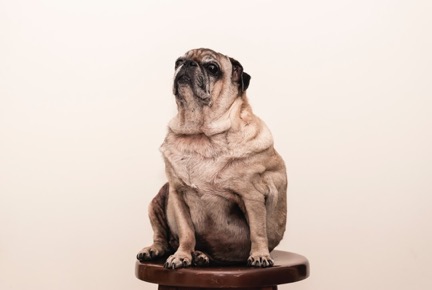How to stop my dog being fat

Dogs suffer from all the obesity / overweight health problems that we do - diabetes, joint problems, being out of breath, arthritis - and they suffer more from the emotional problems that being overweight brings.
Dogs are meant to be able to run about and have fun, and they certainly can't do that when they're overweight.
In short - it's not healthy, in any way to have a dog who is overweight.
Your vet won't always tell you your dog's becoming overweight. So get in there and ask to get your dog weighed and find out what weight they should be.
Here's the thing - the main reason that dogs are overweight is because they're being fed too many calories for the amount of exercise they are getting.
Here's some quick tips
- Get your dog to the vets for a weight check, and then follow their recommendations about feeding etc. Even if you're not sure about your dog's weight, pop into the vets anyway - most vets now-a days offer free weight checks and information.
- Some weight problems are medical - so really! get your dog checked out by your vet.
- DO NOT - suddenly take your dog out for more exercise - if they are overweight then this will put extra stress on their bones - get your vet's advice on an exercise program.
- Stop feeding your dog extra biscuits - mostly, they will be just as happy with a piece of their fry dog food fed as an extra wee treat.
- I read somewhere recently, that 4 crisps is the equivalent to feeding yourself a whole hamburger! That's amazing!!
- Measure out your dog's food, and monitor the weight - remember that the volumes on the side of the pack are "suggestions" - and just that - many times dogs need much less than stated on the pack.
- Whilst in some circumstances, it may be good to simply fill up your dog's bowl in the morning, you can't then possibly tell how much they are actually eating - so switch to feeding your dog at specific times in the day.
- Generally it is recommended to feed your dog twice a day - breakfast and tea-time.
- If your dog tends to bolt their food, then, then look here for help to stop your dog bolting food
- We all like to give our dogs treats. Remember that these all contain calories. Ideally, these would be stated on the side of every treat pack, but it's not. Low calorie treats are now available - BUT - take care that you don't then simply feed more treats! There was a survey recently, for humans, that showed that we dieters eat more packs of low cal foods, because we think we can get away with that..... don't do the same for your dog.
- Even dental chews etc have calories - so take care if you're trying to keep your dogs teeth clean by using there - we prefer squishing tiny amounts of food into toys such as dental kongs and other grooved runner toys.
- The problem with most treats, is that they simply don't last - and are barely even chewed. One way to help with that is to put a tasty tiny piece of dog toothpaste into the slots in dental kong - have a look at them - they are really quite different from normal chew
- What are you feeding your dog? Feeding a higher fat food or a working dog food will most likely be helping them to gain weight. Read more about how to choose dog food here.
Go on - help your overweight dog by putting them on a diet today
IMPORTANT NOTES -
- This is a quick tip only, and doesn't constitute veterinary advice.
- Some dogs may start to scavenge and beg more if their food is cut back - watch out for that - and seek out some training or behaviour help if you can't manage to deal with it.
- Some dogs are lazy and will simply give up if you make food difficult to get at - take it slowly - when you're stuffing a kong or dog chew, make it easy to start with - if the game is too hard, they'll simply give up.